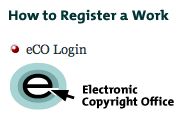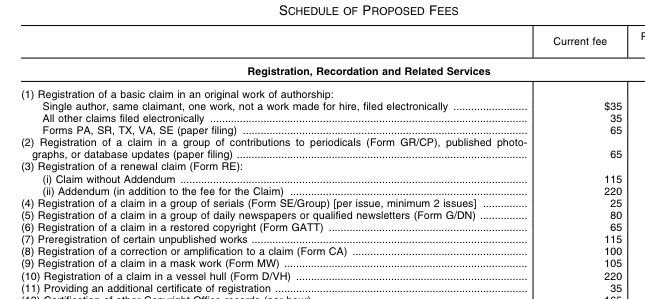U.S. Copyright Office Seeks to Raise Rates
 Those who have been long-time readers of Plagiarism Today know that I’m not exactly a fan of the U.S. Copyright Office (USCO). Whether I have been assailing their poor-quality and outdate online registration system, criticizing it for insane and unreasonably delays in processing registration or merely attacking it’s very existence, I haven’t had many good things to say about it over the years.
Those who have been long-time readers of Plagiarism Today know that I’m not exactly a fan of the U.S. Copyright Office (USCO). Whether I have been assailing their poor-quality and outdate online registration system, criticizing it for insane and unreasonably delays in processing registration or merely attacking it’s very existence, I haven’t had many good things to say about it over the years.
However, the Copyright Office may have one-upped even my criticisms of it. A recent announcement in the Federal Register says that the USCO is seeking to raise its rates for registration and in many cases, by nearly double.
The problem is, the USCO is already a terrible deal for most copyright holders, especially when compared with other countries, none which require registration. It’s an inefficient, slow system that could never survive in a free market and is only used because of the legal benefits for doing so.
However, raising the rates (further) is an exact step in the wrong direction. It will do nothing to fix the delays, the terrible service, the confusing isues or anything else wrong with the system today. All it will do is continue the pattern of disenfranchising the poor, unknowledgeable and those posting digitally from having full copyright protection.
Now isn’t the time for the USCO to raise its rates, but rather, to rethink its role in copyright and step away from from some of its traditional roles.
The Rate Hike and What it Means
 Currently, the rates for a USCO registration are fairly straightforward. If you register online, it costs $35 per registration. If you do so via paper, it costs $65 to cover the extra processing fees. However, under the proposed fee changes, both of those rates would rise drastically.
Currently, the rates for a USCO registration are fairly straightforward. If you register online, it costs $35 per registration. If you do so via paper, it costs $65 to cover the extra processing fees. However, under the proposed fee changes, both of those rates would rise drastically.
For a simple electronic registration, meaning one that includes just a single author that is the same as a claimant, involves just one work and is not a work for hire, the fee will rise to $45. For all other electronic registrations, that feel will rise to $65. For paper registrations, that feel will rise to $100 in all cases.
This means that the USCO is not only raising rates, but eliminating the flat-rate pricing of copyright registrations. While it does mean that those with simple registrations, which includes most independent creators, will pay less than those with more complex ones, including many corporations, everyone pays more than they would have previously and now there is a new element of complexity when it comes to choosing how to register your work.
This, inevitably, is going to cause more delays, more confusion and more problems for registrants, especially those not familiar with the system or the terminology of copyright registration. This, in turn, is going to further disenfranchise content creators from both the copyright registration process and, through proxy, the ability to litigate on copyright issues.
However, the USCO doesn’t appear to be too upset by this, saying that:
“Copyright registration is a voluntary system, not required by law, and pricing that is unaffordable or which exceeds the reasonable expectation of a copyright owner will discourage or prevent participation in the system—to the public’s detriment.”
This, of course, ignores the fact that, without a copyright registration, suing for infringement is not possible and, without it being filed timely, it’s financially infeasible.
As far as why it is moving to raise the rates by such a large amount, the USCO had this to say:
“When fees were adjusted in 2009, the Office was recovering approximately 61.4% of its costs for services. In fiscal year 2011, fee receipts covered only 59.5% of the Office’s costs, a recovery rate that is insufficient by any standard.”
However, the USCO can not timely process an electronic registration for $35, then I propose it isn’t time to raise rates, but for the USCO to get out of the business of doing registrations altogether.
The Free Market
Safe Creative and Myows are two examples of non-repudiation services that provide a function similar to the USCO. They allow users to electronically register works, print certificates and store relevant information (as well as a copy of a fingerprint of the work) in a database.
Both sites provide free accounts and charge fees for higher-end features that are a tiny fraction of the cost of what the USCO charges currently. Best of all, they make it much easier to register works but are hamstrung by the fact they are not official registrars in the U.S., meaning their services carry limited legal weight in the country.
However, it still proves that copyright registration can be cheap, fast and easy if the people behind it are willing to invest the time and energy to make it so. On that front, much of the problem is not the USCO’s fault, but rather, the laws they are working within. But if the USCO can not provide a reasonably efficient service with the contraints its under, then it’s time to rethink it’s position and, on that front, we should likely look to other nations.
Other nations don’t have a copyright office that provides registration services or, if they do, such registrations are not a legal requirement to be able to sue or collect damages. They have not been the sight of copyright chaos but smaller content creators have been able to better protect themselves, rather than having their cases tossed on a technicality or be unable to bring a lawsuit due to their inability to collect full damages.
However, if the U.S. is going to insist upon having so much hinge on registration, then it may want to turn to the private market for help. Under an ICANN-style system of registration, which was first proposed back in 2009, the USCO could let private companies handle the registration process, creating competition over rates and service. This would work similarly to how domain registrars, such as GoDaddy and Enom, handle registration of domains for ICANN.
While I’m not one to say that private companies can do everything better than the government, this is clearly a situation where the government approach has failed and it’s either time to scrap the process or try something radically different.
Bottom Line
In all of the interactions I’ve had with the USCO over the years, I’ve never once had a positive experience. Between computer errors, lost documents, terrible interfaces, botched uploads, long delays and rude, unhelpful support staff, I’m hard pressed to think of anything that’s gone right. But even when things have gone completely right, I’ve always felt over-charged and under-served, like I was being forced to hand my money over with threats rather than something that was to my benefit.
To be clear, the USCO registration cost is not a tax, but a service fee – and service is terrible.
The worst part though is that other nations have shown just how unnecessary the USCO is in this regard. There’s no need for copyright registration and certainly no need to put legal weight on it. If we simply dropped this antiquated and harmful process from our copyright law, it would not only greatly simplify copyright protection, but help balance the interests of smaller content creators, who often don’t know or can’t afford to register everything, and those of larger companies that can trivially afford the process.
The USCO is one of the key reasons content creators in the U.S., as a matter of practice, have much fewer rights than those in other countries. Now, with this rate increase, they want to make the problem that much worse, adding new costs and layers of confusion to the mix.
I encourage everyone to draft a comment on the proposed fee changes and submit it before the May 14th deadline. I will be doing so shortly and posting my public comment here as well.
Hopefully, this can help encourage the USCO to soften the blow or rethink its strategy. If that fails, then it may be time, then it may be time to start thinking about other options for fixing this imbalance.
Because, without action soon, U.S.-based smaller content creators are going to continue to miss out on legal rights and fall farther behind the rest of the world. That is something we simply can not allow.
Disclosure: I have done paid consulting for both Myows and Safe Creative.
Want to Reuse or Republish this Content?
If you want to feature this article in your site, classroom or elsewhere, just let us know! We usually grant permission within 24 hours.
